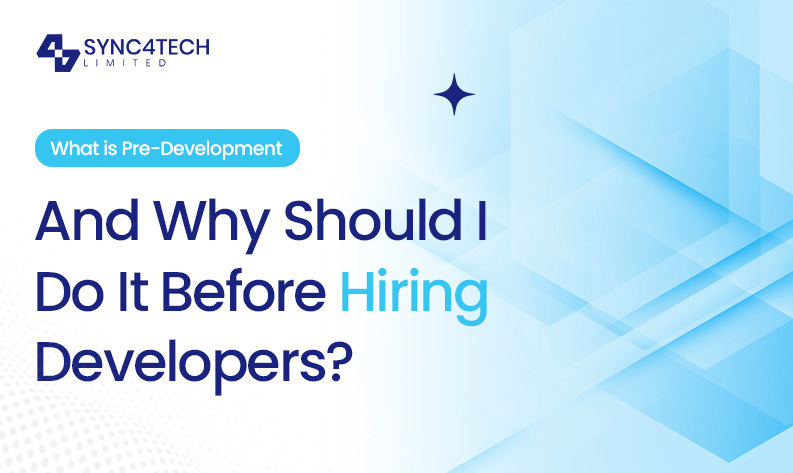

Why do so many great product ideas fall flat before they even ship? It’s not the tech. It’s not the team. It’s what happens before the building starts.
When you skip clarity, you invite confusion (about the user, the goal, the path forward).
That’s where discovery workshops make the difference. Not just a formality, but a space to ask the right questions early, before assumptions turn into wasted effort.
In this piece, we’ll unpack the real role of discovery workshops: how they guide smarter planning, align teams, and set up your product, especially one powered by AI, for long-term success.
Let’s dive in.
A discovery workshop is a focused, collaborative session that takes place before any design, development, or AI integration begins. It’s where the team pauses, zooms out, and gets crystal clear on what they’re building, why they’re building it, and who it’s for.
In simple terms, it’s a deep dive conversation between your core team(product owners, designers, developers, and sometimes clients or stakeholders) to make sure everyone’s on the same page before work starts.
This is where a lot of confusion starts. So let’s clear it up;
A discovery workshop, on the other hand, is active. It’s where you ask the hard questions. Debate ideas. Validate assumptions. And uncover things the brief might have missed. This is more of an investigation than planning.
The point isn’t to have every answer, but to surface the right questions. By the end, your team should walk away with a shared understanding of the problem space, user context, and technical path forward. If you’re planning to build something smart, scalable, and user-first, this is where you start. Not with features. Not with wireframes. But with clarity.
Right at the beginning, before you sketch a wireframe, draft a user flow, or write a single line of code.
Discovery workshops are part of predevelopment for a reason. This is where you shape strategy, not just conform it. If you wait until design or development has started, you’re already reacting to decisions instead of guiding them. So, when exactly should you run a discovery workshop?
Basically, if you’re making something new or making something better, a discovery workshop is your starting line. It’s not an extra step or nice to have, but a smart strategy to avoid rework later.

You’re not here to brainstorm wildly, you’re here to make confident, informed decisions before building starts. Here’s how a discovery workshop flows:
The session kicks off by getting everyone on the same page:
Next, you define who you’re building for. This could involve reviewing existing research, mapping out user personas, or even inviting a support lead or domain expert to share insights.
This is where ideas turn into flows. You’ll map key actions users need to take, identify moments where AI might step in, and start separating the “must-haves” from the “nice-to-haves.” The goal is to have a clear picture of what your MVP (or next release) needs.
Every product has unknowns; this is where you name them early. Technical blockers, missing data, integration challenges, and even trust issues with AI features. Better to flag them now than mid-sprint.
You wrap with a shared understanding:
By the end of the session, you won’t have a fully fleshed-out solution, but you will have clarity. And that’s the most valuable thing you can walk away with at this stage. Think of it this way: a good discovery workshop won’t give you all the answers, but it will make sure you’re asking the right questions.
A discovery workshop works only if it’s driven by outcomes, not just checklists. That starts with strong prep.
From there, skilled facilitation makes all the difference. It’s not just about walking through slides, it’s about guiding real, sometimes messy discussions that lead to clarity.
So, how do you know it worked? You should walk away with shared goals, early risks on the table, and a team that’s solving the right problem.
Too often, teams treat the discovery workshop as just another formality—a quick box to check before “real work” begins. Others skip it altogether in the name of speed, only to double back later when misaligned assumptions start causing delays.
Another common miss? Leaving out key decision-makers. Without the right people in the room, you get half-answers, missed context, and a whole lot of rework.
The fix is simple: take discovery seriously, run it early, and make sure the people who can say “yes” or “no” are actively involved from the start.
When you’re building AI first or AI-enhanced features, discovery isn’t just helpful, it’s essential. Unlike traditional features, AI systems depend on early access to clean data, clearly defined logic, and well-aligned user expectations. You can’t add AI later, without risking broken flows, confused users, or wasted effort.
That’s why discovery workshops for AI products need to explore things like AI readiness, ethical implications, and failure scenarios up front. Simply put, if you're wondering how to plan AI features during discovery, the answer is to start early or risk starting over.
If you’re still on the fence about discovery, here’s the simplest way to think about it: the choices you make here ripple through everything that comes next. Architecture, timelines, team clarity—it all starts in this room.
You won’t get every answer on day one. But what you will get is direction, alignment, and fewer surprises down the line.
And if your goal is to build something that lasts—and actually serves the people it’s meant for—this is where you slow down, zoom out, and make sure you're solving the right problem.
Rene Wells
Author
How to Start Software Projects the Right Way
5 min • Sep 15, 2025Why Discovery Workshops Are the Backbone of Successful Product Development
2 day ago • Sep 12, 2025What Are the Common Mistakes Companies Make Before Software Development?
6 day ago • Sep 06, 2025What are the benefits of business process automation in 2025?
15 days ago • Sep 04, 2025The Importance of Implementing Data Engineering Processes in Businesses
20 days ago • Sep 01, 2025Business Analysis
Agile Development
Technical Writing
Requirement Gathering
Business Process Model
Change management
Rene Wells •
5 min • Sep 15, 2025
Ready to get started on your project? We're here to listen! Tell us about your project, and together, let's bring your vision to life